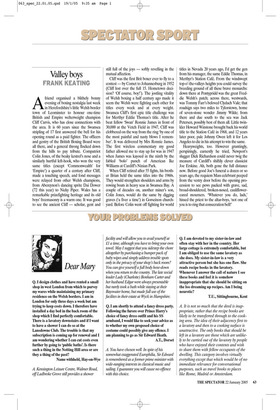Valley boys
FRANK KEATING
Afriend organised a blithely bonny evening of boxing nostalgia last week in Herefordshire’s little Welsh border town of Leominster to honour one-time British and Empire welterweight champion Cliff Curvis, who has close connections with the area. It is 60 years since the Swansea stripling of 17 first answered the bell for his opening round as a paid fighter. The officers and gentry of the British Boxing Board were all there, and a general throng flocked down from the hills to pay tribute. Compatriot Colin Jones, of the beaky kestrel’s nose and a similarly hurtful left-hook, who won the very same titles (except ‘Commonwealth’ for ‘Empire’) a quarter of a century after Cliff, made a touching speech, and fond messages were relayed from other Welsh champions, from Abercynon’s dancing sprite Dai Dower (72 this year) to Nicky Piper. Wales has a remarkable prizefighting heritage and its old boys’ freemasonry is a warm one. It was good to see the ancient Cliff — scholar, gent and still full of the joys — softly revelling in the mutual affection.
Cliff was the first Brit boxer ever to fly to a contest — by Comet to Johannesburg in 1952 (Cliff lost over the full 15. Hometown decision? ‘Of course, boy!’). The jostling vitality of Welsh boxing a half century ago made it seem the Welsh were fighting each other for titles every week and at every weight. Swansea Cliff’s first epic title challenge was for Merthyr Eddie Thomas’s title. After he beat fellow ‘Swan’ Ronnie James in front of 30,000 at the Vetch Field in 1947, Cliff was clobbered on the way from the ring ‘by one of the most painful and nasty blows I remember’. It was delivered by Mrs Ronnie James. The first wireless commentary my good father allowed me to stay up for was in 1947 when James was kayoed in the ninth by the fabled ‘bolo’ punch of American Ike Williams at Cardiff’s Ninian Park.
When Cliff retired after 55 fights, his brother Brian held the same titles into the 1960s. They would strengthen shoulders and arms by rowing boats in heavy seas in Swansea Bay. A couple of decades on, another miner’s son, Colin Jones, would do the same by digging graves (‘a fiver a time’) in Gorseinon churchyard. Before Colin went off fighting for world titles in Nevada 20 years ago, I’d get the gen from his manager, the same Eddie Thomas, in Merthyr’s Station Café. From the windswept top-o’-the-valleys heights you could survey the breeding ground of all these brave monarchs: down there at Pontypridd was the great Freddie Welsh’s patch; across there, westwards, was Tommy Farr’s beloved Clydach Vale; that roadsign says two miles to Tylorstown, home of seven-stone wonder Jimmy Wilde; from there and due south to the sea was Jack Petersen, possibly best of them all. Little twinkler Howard Winstone brought back his world title to the Station Café in 1968, and 12 years later poor, pale Johnny Owen left it for Los Angeles to die in his attempt to win the same.
Heavyweights, too. However gruntingly, perspiringly, earnestly he tried, Newport’s slugger Dick Richardson could never twig the measure of Cardiff’s shiftily clever classicist Joe Erskine. Ah, both gone the full distance now. Before good Joe’s funeral a dozen or so years ago, the requiem Mass celebrant peeped from the vestry door before the opening procession to see pews packed with grave, sad, broad-shouldered, broken-nosed, cauliflowereared mourners. ‘Whatever you do, lads,’ hissed the priest to the altar-boys, ‘not one of you is to ring that consecration bell!’













































 Previous page
Previous page